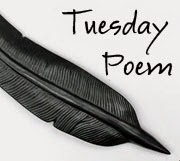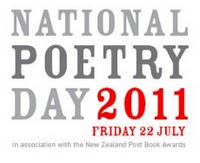Barbara’s work has been published widely here and overseas, and she has won or co-won four haiku competitions. She has had two collections of poetry published, namely Duck Weather (Poets Group 2006) and The Corrosion Zone (HeadworX 2011). She leads a poetry group called the Airing Cupboard Women Poets, and is an active member of the local haiku community. She has edited and typeset books by other people, including the New Zealand Poetry Society’s annual anthologies of 2009 and 2010. She is an editor for Sudden Valley Press, and holds an MA in Creative Writing (Vic).
Barbara's poem Fatigues was my Tuesday Poem this week.
Why did you choose the title The Corrosion Zone for your second collection, and was it a title you'd already chosen before the recent Christchurch earthquakes?
The title was suggested by a LIM report for my new house, which stated it was in the ‘corrosion area, within 200 metres of the coast’. It is a reminder that, just as the solid ground on which one stands, can be swept away at any moment, relationships and people we know can crumble and corrode. The cover illustration shows an ancient sea cliff at Godley Head. I had sent the book to the printer just before the earthquake of February struck. I did not know how prescient my title would be.
I'll put the question baldly: what's it like being a Christchurch poet at the moment?
Inside my home I can hardly tell that anything has happened, except for a few new cracks in the wall, and an occasional small or larger tremor. Through the west window I look out on a cliff where the houses are deserted. Out my kitchen window to the south I see where my street goes up the hill. It is blocked by an ominous rock fall, and the houses there are visibly wrecked. My little block has become an enclave of liveable homes in a cul de sac. There aren’t many places to go for a walk or shop; almost all the libraries, cinemas, art galleries are closed.
The Port Hills area was one of outstanding beauty, and September here was almost a picnic, but on February 22 it became scary, stressful, uncertain, ugly, tedious and uncomfortable. It was hard to concentrate on anything, including one’s writing. But as time has passed I became more accustomed to it. And there is an adrenalin kick in surviving a big one, and the confidence from realising I can actually cope.
I was away for the February one. When June happened I realised that my life was not in much danger. It was just an everyday matter of, initially without power or water, cleaning up, and tapping into my stockpile, literal and figurative. I realised that it was novel and perhaps even a privilege to be part of this thing. For a while I had a new interest, walking around the ruined areas with my camera and notebook. In autumn, instead of writing about fallen leaves, I wrote about fallen houses.
Unfortunately June 13th has made that dangerous, as all the cliffs fell down. The paths and most roads are threatened by rock falls. It is quite depressing to realise that we may not have had the last big quake, and hard to absorb all the change and destruction. I have lost friends who have shifted away; it is difficult for groups to meet. But people have become friendlier, more community minded; and now we have something to talk about.
I see that you were born in Invercargill. I spent part of my childhood in Invercargill, and I returned for a literary festival earlier this year. I was struck by how isolated many Invercargill writers feel from the rest of the country. Did that sense of isolation affect you?
I was brought up and educated in Invercargill. My father was a violinist whose day job was in the family firm, coffee and spice merchants. We were brought up on classical music and free jellies. Southland has wonderful wilderness areas like Fiordland and Stewart Island. I am grateful that my dad dragged all ten of us round these and other places in a Kombi van.
As our house was crowded I used to withdraw into my bedroom and read books. I’d look out the window to distant fields, and dream of escape. At age 18 I left for Otago University to study English. Dunedin seemed a huge cultural paradise. There I met my first husband. He and I migrated to Christchurch. My father meanwhile became a violin teacher in Dunedin, the family shifted, and I had no reason to go back to Invercargill. I’d found the smallness of the place stifling, but at the same time I developed a lifelong passion for wilderness and open spaces.
Will those who have read your first collection, Duck Weather, find that there's a big difference between the two collections?
You’d probably guess from the title “Duck Weather” that it was a lot about the natural world and its inhabitants. I think this is my core subject matter. It was quirky and light hearted, though a darker element made an appearance as already there was a strain of depression and suicide in my family. This is another topic which interested me over a long period. I don’t think my style is much different in the two books.
And for those who don't know your work, how would you describe your poetry – does it follow a particular style or poetic tradition?
Usually I don’t think much about this but I guess I would describe myself as a minimalist writer in the modernist tradition. As a girl I started off with an enthusiasm for Wordsworth and other Romantic poets. Later I discovered New Zealand poetry and was impressed by R A K Mason and Allen Curnow among others, in the green covered Penguin Book of New Zealand Verse. I was struck by the fact that they could use plain conversational language, and wrote about these islands I inhabit.
This seems a long time ago now. Later I was impressed by Yellow Pencils, an anthology of NZ women writers. I was struck by the freshness and honesty of Rachel MacAlpine’s work in that book, for instance. There are many other poets whom I admire, to mention a few, Vivienne Plumb, Janet Charman, and David Gregory. These poets may be rather bleak.
I have the mottos “less is more”, and “when in doubt cut out”. I pare my work down and get rid of frills; I want each little line to resonate. Form develops rather than being imposed. At the same time I am very conscious of the sounds of words, and like to use assonance and half rhymes. I have had little affairs with certain words such as “fall” “hide” and “down”, often quite simple ones, which have layers of meaning and a beautiful sound also. I work them hard. The haiku form also has the challenge of making a tiny whole suggest huge spaces, like a Japanese painting.
The poems in The Corrosion Zone work through a lot of grief. Were these especially hard poems to write, or is it all, in the end, just raw material for a poet?
Around the turn of the Millennium I experienced a series of losses. The worst maybe was that our youngest brother Andrew took his own life. He was an intense and artistic person, an inspiration to the rest of us who were artistically inclined. At the same time my husband of thirty years had a midlife crisis and left, and I had to shift from Sumner, the home for goodness knows how long. And a few other things. I found it impossible to write about anything else.
I do not think grief is necessarily negative. It is like winter. It can have its own beauty and even lightness. It may last for years, but hopefully is not the end, as it wasn’t for me. I hope that I have avoided the bog and taken the reader safely to solid ground.
I noticed that a lot of your poems use two- and three-line stanzas – forms that I also enjoy using. What draws you to writing in stanzas of this length, and indeed, how do you decide on the length of stanza to use in a poem?
I like them too. I do not usually set out to write these forms but it happens.
You edited the 2009 and 2010 New Zealand Poetry Society anthologies. I know for myself that while editing is very time-consuming, editing other people's work can offer rewarding insights into one's own work. Is this the case for you?
It is a great privilege to edit the work of other poets. I was amazed at the imagination and ability of both experienced and beginner poets, but actually I felt rather overwhelmed too. It made me realise that there are a lot of other ways of writing besides those which I have fallen into.
If it's not a secret, what writing projects are you working on at the moment?
I have a collection of my brother Andrew’s poems almost ready for the press, called Things to Know. It is being published by Sudden Valley Press. Apart from that I have been writing some poems about the earthquakes, and living in the present moment. Someone suggested a "Corrosion Zone 2" – but I may have had enough of adverse events!
How to buy The Corrosion Zone
Addenda are the distributors. It is on the shelf at Unity Books, and mentioned on Wheelers.co.nz, Librarything.com, and unibooks.co.nz
It's available to be purchased online from: fishpond.co.nz, ziwi.co.nz, and emporiumbooks.com.au.
The Otago Daily Times review is online - it's the second review on this page: http://www.odt.co.nz/entertainment/books/168183/poetry?page=0%2C1










